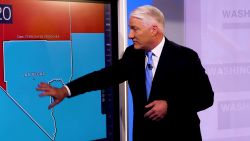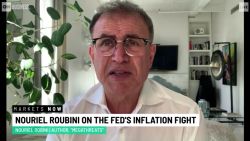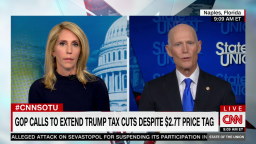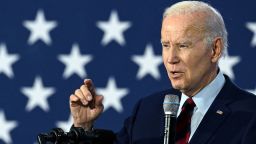A version of this story first appeared in CNN Business’ Before the Bell newsletter. Not a subscriber? You can sign up right here.
Last week was a volatile one on Wall Street, with stocks falling after Federal Reserve chair Jerome Powell dashed the market’s dreams of a pivot and suggested that more big rate hikes are likely coming. But Wall Street is still turning its hopes to Washington.
Investors are betting on a big Republican wave in the midterm elections. If Republicans take at least one chamber of Congress in Tuesday’s midterm election, that will likely result in more gridlock, which the market usually loves.
According to data from Edelman Financial Engines, the S&P 500 had an annualized return of 16.9% since 1948 during the nine years when a Democrat was in the White House and Republicans had a majority in both chambers of Congress. That compares to 15.1% during periods of full Democratic control and 15.9% in years when there was a unified GOP government.
Investors are more than happy when politicians bicker but don’t actually enact any new laws that may hurt corporate profits.
Forget about taxes
One example is taxes on businesses.
“What do midterms mean for the markets? If Republicans get the House, tax hikes are dead in the water,” said David Wagner, a portfolio manager with Aptus Capital Advisors. Republicans may be less likely to approve a windfall tax on oil company profits and also are generally not in favor of tax hikes on the wealthy.
The market also is betting that some sectors could get a boost – even if Republicans take control of the House or Senate and presumably make it more difficult for President Biden to get laws passed.
That’s because there are some areas of consensus for the White House and Republican lawmakers.
“A GOP sweep could lead to more spending on defense,” said Wagner. “Increasing the budget for defense seems to be a bipartisan issue.” The House passed a record high defense budget proposal this summer.
Biden and Republicans also seem to be on the same page when it comes to boosting spending on infrastructure. That could give a boost to utilities, construction companies and some real estate stocks. Congress did pass a more than $1 trillion bipartisan infrastructure bill last year that was championed by President Biden after all. But it’s not yet clear what the appetite for more spending is…even if there is consensus that more is needed.
“Everything is polarized politically, but there has been common ground on infrastructure. That was even the case with [Donald] Trump and [Hillary] Clinton in 2016,” said Jim Lydotes, deputy chief investment officer of equities at Newton Investment Management. “As a country we’ve under-invested in infrastructure. That’s an area where there is a lot of agreement.”
Gridlock isn’t always a good thing
Of course, there is no guarantee that Biden and other Democratic leaders will be able to work effectively with Republicans in Congress. After all, the political narrative will quickly shift to the 2024 presidential race once the midterms are in the rear view mirror. Congress and the White House may spend more time bickering than trying to pass legislation.
There also may be some significant drawbacks to a divided government, especially if fears of a recession come to fruition next year.
Rob Dent, US senior economist at Nomura Securities International, said there could be less federal government spending on social safety net programs if Republicans take control of Congress.
“All else being equal, that could lead to a longer recovery from a recession,” Dent said. That would be bad for stocks more generally since consumer spending drives corporate profits.
Dent added that there’s also the unwelcome possibility of more bickering in Washington about the debt ceiling. The last time that was a major issue was during President Barack Obama’s first term. The US lost its prized perfect AAA credit rating from Standard & Poor’s as a result of the debt ceiling drama. The stock market plunged more than 5% after the downgrade happened in August 2011.
“This election outcome is less about what might get done versus what might not get done to help the economy during a downturn,” Dent said. “We’re worried about divided government leading to brinkmanship about the debt limit and the potential for government shutdowns. We haven’t had to deal with that in quite some time.”
But at the end of the day, political headlines are often just noise for the markets. Ameriprise chief market strategist Anthony Saglimbene said on a conference call last week about the midterms that stocks have historically gone up after elections, no matter which party controls the White House and Congress.
The midterms may also take a “back seat” to other macro issues. Saglimbene noted that “growth, profits, inflation and interest rates” matter more to investors over the long haul. He conceded that election results could lead to more near-term volatility, but that the market is already pricing in a strong likelihood of divided government.
Inflation nation
Politically-induced market and economic volatility is the last thing that consumers, investors or the Fed need given that inflation has turned out to not be transitory as Fed chair Powell had predicted for much of 2021.
It is clear that higher prices for commodities and other raw materials, shipping and other transportation expenses and labor costs are not going away anytime soon.
Steve Cahillane, the CEO of cereal and snack food giant Kellogg (K), even said on the company’s most recent earnings call last week that the thought that “inflation was going to be transitory was always obviously ridiculous.”
We’ll get a better sense of just how persistent inflation is on Thursday after the government reports the September consumer price index (CPI) figures.
Economists surveyed by Reuters are forecasting that overall prices rose 0.7% last month, up from a 0.4% gain in September. That would likely push year-over-year prices, which rose 8.2% over the past 12 months through September, even higher as well. The continued strength of the jobs market will put more pressure on prices too.
“The labor market is resilient and inflation is spreading to the services sector, too,” said Troy Gayeski, chief investment strategist with FS Investments.
That may lead to more worries that the economy may be headed for a so-called stagflation environment, a period where stagnant growth occurs alongside high inflation. If that happens, the Fed is likely to keep rates higher for longer.
“We will exit this inflationary/stagflationary situation eventually,” Gayeski said. “But it’s not like the Fed will quickly cut rates back to zero. It’s going to be really cautious.”
Up next
Monday: China trade data; earnings from BioNTech (BNTX), Take-Two (TTWO), Ryanair (RYAAY) and Lyft (LYFT)
Tuesday: US midterm elections; earnings from DuPont (DD), Norwegian Cruise Line (NCLH), Lordstown Motors, Disney (DIS), Occidental Petroleum (OXY), News Corp (NWS), IAC (IAC), AMC (AMC) and Novavax (NVAX)
Wednesday: China inflation data; earnings from D.R. Horton (DHI), Weibo (WB), Hanesbrands (HBI), Capri Holdings (CPRI), Roblox, SeaWorld (SEAS), Wendy’s (WEN), Redfin (RDFN) and Beyond Meat (BYND)
Thursday: US CPI; US weekly jobless claims; earnings from Nio (NIO), Ralph Lauren (RL), Tapestry (TPR), WeWork, Six Flags (SIX), Yeti (YETI) and Warby Parker
Friday: US bond market closed for Veterans Day; UK GDP; US U. of Michigan consumer sentiment; earnings from SoftBank (SFTBF)





























